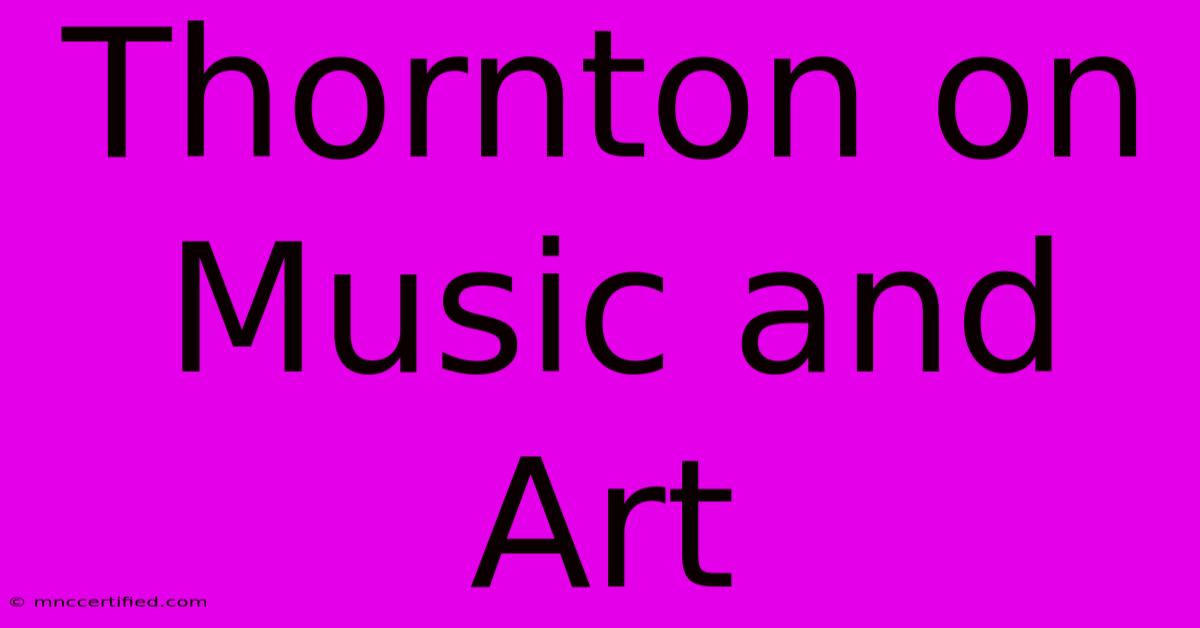Thornton On Music And Art

Table of Contents
Thornton on Music and Art: A Deep Dive into Aesthetics and Creativity
Thornton Wilder's perspectives on music and art, though not explicitly laid out in a single treatise, are woven throughout his plays, novels, and essays. Understanding his views requires examining his works holistically, recognizing the interconnectedness he saw between art, life, and the human experience. This exploration delves into Wilder's implicit philosophies on music and art, exploring their role in shaping human understanding and emotional expression.
The Power of Music in Wilder's Works
Music, in Wilder's universe, often acts as a subtle yet powerful force, shaping the emotional landscape of his narratives. It's not just background noise; it's a vital element reflecting character, setting the mood, and foreshadowing events. Consider the recurring use of hymns and folk songs in Our Town. These seemingly simple melodies carry profound weight, underscoring the cyclical nature of life, death, and remembrance. The almost ethereal quality of the music underscores the play's themes of mortality and the ephemeral nature of existence.
Music as a Unifying Force
Wilder often uses music to create a sense of community and shared experience. The collective singing in Our Town highlights the bonds within the small-town setting, creating a feeling of unity and shared history. This reflects Wilder's belief in the power of communal artistic expression to foster empathy and understanding.
Music as Emotional Catalyst
In The Skin of Our Teeth, the chaotic and sometimes jarring use of music mirrors the play's tumultuous plot. The dissonance reflects the absurdity and fragility of life, further highlighting the unpredictable nature of human existence. The juxtaposition of seemingly disparate musical styles reflects the fragmented yet ultimately unified nature of the human experience.
Art as Reflection and Revelation in Wilder's Writings
Wilder’s appreciation for art extends beyond music; it encompasses the visual arts, literature, and even the art of living itself. He saw art not merely as an aesthetic pursuit but as a crucial means of self-discovery and understanding the world around us.
The Theatre as a Canvas
For Wilder, the stage was a canvas, allowing him to explore complex themes and portray the human condition with remarkable sensitivity. His theatrical works are themselves a testament to the power of art to illuminate the human experience, offering both profound insights and moments of poignant beauty. His experimental techniques – like the stage manager's direct addresses in Our Town – challenged traditional theatrical conventions and showcased his innovative approach to artistic expression.
Art Imitating Life, Life Imitating Art
Wilder's works often blur the lines between reality and artifice, mirroring the interplay between art and life. His characters often find solace and meaning in artistic expression, highlighting the transformative power of creative engagement. This interconnectedness suggests that art is not merely a reflection of life but a vital component of it, shaping our perceptions and understandings.
The Enduring Legacy: Thornton Wilder's Artistic Vision
Thornton Wilder's enduring legacy rests not only on his remarkable literary achievements but also on his implicit philosophy regarding the transformative power of music and art. He saw art as an essential element of the human experience, capable of fostering empathy, revealing profound truths, and offering a means of transcending the limitations of ordinary life. His works continue to resonate with audiences worldwide, a testament to the lasting power of his artistic vision and its enduring relevance.
SEO Considerations: Keyword Optimization and Promotion
Keywords: Thornton Wilder, music, art, Our Town, The Skin of Our Teeth, theatre, literature, aesthetics, creativity, human experience, emotional expression, American literature, play, novel, essays, literary analysis, dramatic techniques.
On-Page SEO: This article naturally incorporates the keywords throughout the text, ensuring relevance and search engine optimization. Headers (H2, H3) improve readability and structure.
Off-Page SEO: Promoting this article involves sharing it on social media platforms, submitting it to relevant online directories, and building backlinks from other reputable websites focusing on literature, theatre, or American studies. Guest posting on related blogs would also be beneficial. Engaging with relevant online communities and forums can also increase visibility. Furthermore, creating high-quality content consistently around similar topics will help improve domain authority and overall search rankings.

Thank you for visiting our website wich cover about Thornton On Music And Art. We hope the information provided has been useful to you. Feel free to contact us if you have any questions or need further assistance. See you next time and dont miss to bookmark.
Featured Posts
-
Magnum Insurance Kankakee Illinois
Nov 16, 2024
-
Life Insurance Leads Live Transfer
Nov 16, 2024
-
Watch Portugal Vs Poland Uefa Nations League Time
Nov 16, 2024
-
Landman Billy Bobs Life Story
Nov 16, 2024
-
Strictly Doctor Who Aid Children
Nov 16, 2024